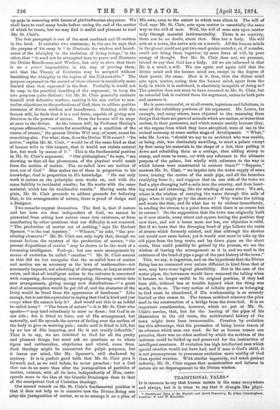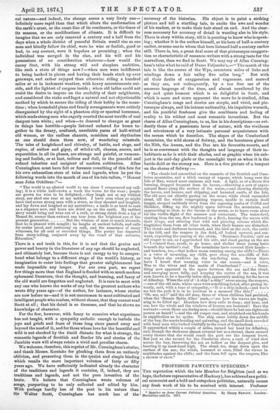TRADITIONAL TALES.* IT is common to say that human nature
is the same everywhere and always, but it is truer to say that it changes like physi-
• Traditional Tales of the English and Scotch Peasantry. By Allan Cunningham. London: F. and W. Kerslake.
cal nature—and indeed, the change seems a very lively one— infinitely more rapid than that which alters the conformation of the earth's crust, or the coast-line of its continents, or the times of its seasons, or the modifications of climate. It is difficult to imagine that we are only removed a century and a half from the days when a whole district of peaceful Britain would rise as one man and blindly follow its chief, were he wise or foolish, good or bad, to any contest, were it hopeless or promising ; when the individual was merged in the clan, and his will and his possessions of no consideration whatever—how would the canny Scot, with his strong will and sleepless ambition, like such a state of things now ? —when men were indifferent to being hacked in pieces and having their heads stuck up over gateways, and rather enjoyed than otherwise riding a hundred
miles or so in inclement weather, with heavy accoutrements out- side, and the lightest of cargoes inside ; when old ladies could not resist the desire to impose on the credulity of their neighbours, and considered the stake and fagot a natural and not objectionable method by which to secure the riding of their hobby in the mean- time ; when household plans and family arrangements were entirely disorganised by the sight of a phantom ship or spectral horseman, which made strong men who eagerly courted the most terrific of real dangers turn white ; and when—to descend to changes as great in things less horrible—people listened unbored for hours to- gether to the dreary, confused, unreliable yarns of half-witted old women, or the endless chaunts, musicless and rhythmless as one should deem them now, of wandering minstrels. The tales of knighthood and chivalry, of battle, and siege, and rapine, of outlaw and gipsy, of witcic -aft, charms, omens, and superstition in all its phases, are strange and painful, or unmean-
ing and foolish, or at best, tedious and dull, to the peaceful and refined inheritor and recipient of modern cultivation. Allan Cunningham must have felt or foreseen something of this fate for his own exhaustless store of tales and legends, when he put the following words into the mouth of one of his tale-tellers, " Honest man John Ochiltree :"—
,4 The world is an altered world to me since I commenced my call- ing; it is a white half-crown a week the worse for the wear ; people are grown too wise to be delighted,—they laugh not at my wittiest story, nor shed one tear at my saddest. I have seen when ye might have tied seven strong men with a straw, as they shouted and laughed, and lay down and laughed at my narratives ; a smile is as hard to earn as a sixpence now, and tears are dried up on the earth. My saddest story would bring red wine out of a rock, or strong drink from a log of Memel fir, sooner than extract one tear from the brightest eye of the
present generation But the wisdom of man so much abounds, that ho is pleased with nought ; he laughs at ancient beliefs, and calls for ocular proof, and testimony on oath, and the assurance of many witnesses, for all oral or recorded things. The poetry has departed from story-telling, conjured away by the wand of that sorcerer, Education.'
There is a sad truth in this, for it is sad that the genius and power and beauty in the literature of any age should be neglected, and ultimately lost, because there is not energy to try to compre- hend what belongs to a different stage of the world's history, or
imagination to enter into feelings that greater enlightenment has made impossible any longer. For our own part, we regret few things more than that England is flooded with so much modern ephemeral literature, that the thought, and learning, and fancy of the old world are forgotten and neglected. It is rare to meet with any one who knows the works of any but the greatest authors who wrote fifty years ago—of the author, for instance, whose stories are now before us—and it is not uncommon to meet cultivated and intelligent people who confess, without shame, that they cannot read
Scott at all ; that his detail is so tiresome, and that be shows no knowledge of character.
For the few, however, with fancy to conceive what experience has not taught, with a sympathy catholic enough to include the joys and griefs and fears of those long since passed away and beyond the need of it, and for those whose love for the beautiful and wild is not checked by the timid distaste for what is strange, the romantic legends of Scottish and Border life and stories of the Jacobite wars will always retain a vivid and peculiar charm.
We welcome, therefore, this reprint of Mr. Cunningham's stories, and thank Messrs. Kerslake for plucking them from an untimely oblivion, and presenting them in the quaint and simple binding which recalls the more important volumes of forty or fifty years ago. We have sufficiently indicated already the character of the traditions and legends it contains, if, indeed, they are traditions and legends, and not the pure invention of the brain. We believe that Cunningham wrote volumes of songs, purporting to be only collected and edited by him. With perhaps hardly less of the poet in his nature than Sir Walter Scott, Cunningham has much less of the accuracy of the historian. His object is to paint a striking picture and tell a startling tale, to excite the awe and wonder of his readers, or to make their hair stand on end. And the clear- ness necessary for accuracy of detail is wanting also in his style.
There is story within story, till it is puzzling to know who is speak- ing ; whether it is the author himself, or his hero of half-a-century earlier, or some one to whom that hero listened half a century earlier still. There is, too, a great deal more of that picturesque exaggera- tion so characteristic of romance-writers with a strong taste for the marvellous, than we find in Scott. We may say of Allan Cunning- ham's tales what he said of Dame Foljambe's,—" The march of the tale is like the course of the Wye, seventeen miles of links and windings down a fair valley five miles long." But with all their faults of exaggeration and vagueness, and marred as they are, not unfrequently, by a too free use of the amorous language of the time, and almost unrelieved by the dry and quiet humour which is so delightful in Scott, and which is more and more apparent the more he is studied, Allan Cunningham's songs and stories are simple, and vivid, and pic- turesque always, and his intense nationality, his impulsive warmth, and his youthful freshness give the semblance and feeling of reality to his wildest and most romantic inventions. But the charm of Allan Cunningham, to us, lies in his descriptions—so evi- dently those of a passionate lover of nature, with the vividness and minuteness of a very intimate personal acquaintance with the scenes which he describes. The slopes of the Cumberland mountains, the wild shores of Solway, and the beauteous glens of the Nith, the Annan, and the Dee are his favourite resorts, and he is as conversant with the thoughts and language of their in- habitants as he is with their abodes, and as graphic when his sub- ject is the mid-day glade or the moonlight tryst as when it is the battle-field or the stormy sea. Here is a fine picture of a tempest on the shores of Solway :—
" The clouds had assembled on the summits of the Scottish and Cum- brian mountains, and a thick canopy of vapour, which hung over the Isle of Man, waxed more ominous and vast. A light, as of a fierce fire burning, dropped frequent from its bosom,—throwing a sort of super- natural flame along the surface of the water,—and showing distinctly the haven, and houses, and shipping, and haunted castle. of the Isle. The old men sat silently gazing on the scone, while cloud succeeded cloud, till the whole congregating vapour, unable to sustain itself longer, stooped suddenly down from the opposing peaks of Criffel and Skiddaw, filling up the mighty space between the mountains, and approaching so close to the bosom of the ocean, as to leave room alone for the visible flight of the seamew and cormorant. The water-fowl, starting from the sea, flew landward in a flock, fanning the waves with their wings, and uttering that wild and piercing scream which dis- tinguishes them from all other fowls, when their haunts are disturbed. The clouds and darkness increased, and the bird on the rock, the cattle in the fold, and the reapers in the field, all looked upward, and sea- ward, expecting the coming of the storm. 'Benjamin Forster,' said an old reaper to me, as I approached his side, and stood gazing on the sea
I counsel thee, youth, to go home, and shelter those young hairs beneath thy mother's roof. The mountains have covered their heads— and hearken, too,—that hollow moan running among the cliffs !—There is a voice of mourning, my child, goes along the sea-cliffs of Sol- way before she swallows up the sea-faring man. Seven times have I heard that warning voice in one season—and it cries, Woo to the wives and the maids of Cumberland
Some- thing now appeared in the space between the sea and the cloud. and emerging more fully, and keeping the centre of the sea, it was soon known to be a heavily laden ship, apparently making for the haven of Allanbay. When the cry of • A ship ! a ship ! ' arose among the reapers, —one of the old men, whose eyes were something faded, after gazing in- tently, said, with a tone of sympathy,—' It is a ship indood,—and woe's
me bat the path it is in be perilous in a moment like this 1' Oh, see, see !' said the old man, three of whose children had perished,
when the 'Bonnie Babie Allan' see how the waves are begin- ning to be lifted up ! Hearken bow deep calls to deep; and hear, and see, how the winds and the windows of heaven are loosened Save thy servants—even those sea-faring men—should there be but one righteous person on board ]'—and the old reaper rose, and stretched out his bands in supplication as he spoke. The ship came boldly down the middle of the bay, the masts bending and quivering, and the small deck crowded with busy men who looked wistfully to the coast of Cumberland It approached within a couple of miles, turned her head for Allanbay, and, though the darkness almost covered her as a shroud, there seemed every chance that she would roach the port ere the tempest burst. But just as she turned for the Cumbrian shore, a rush of wind shot across the bay, furrowing the sea as hollow as the deepest glen, and heaving it up mast-bead high. The cloud, too, dropt down upon the surface of the sea; the winds, loosened at once, lifted the waves in multitudes against the cliffs; and the foam fell upon the reapers, like a shower of snow."



































 Previous page
Previous page